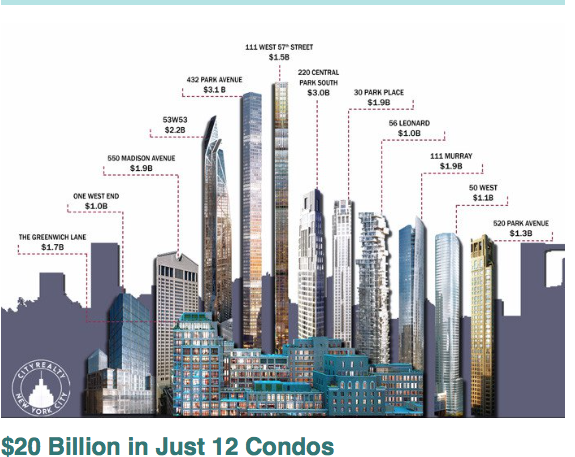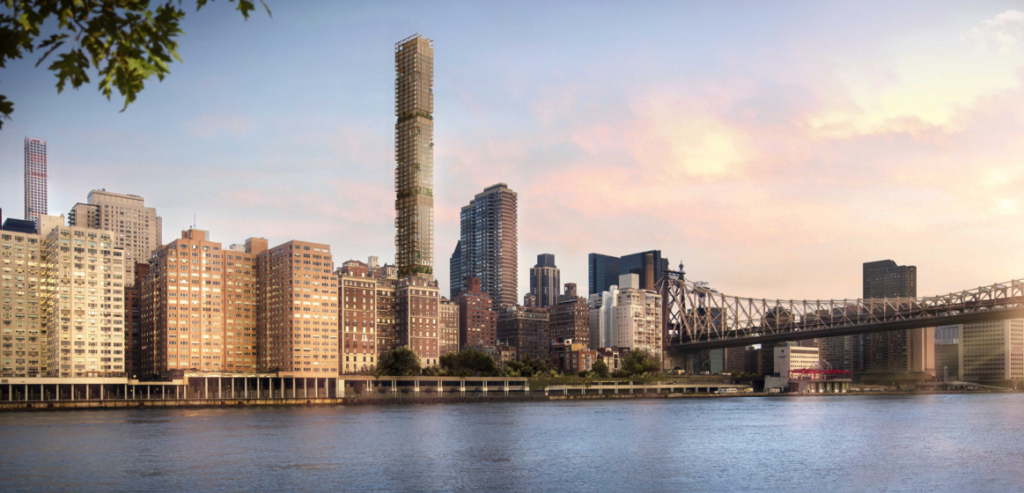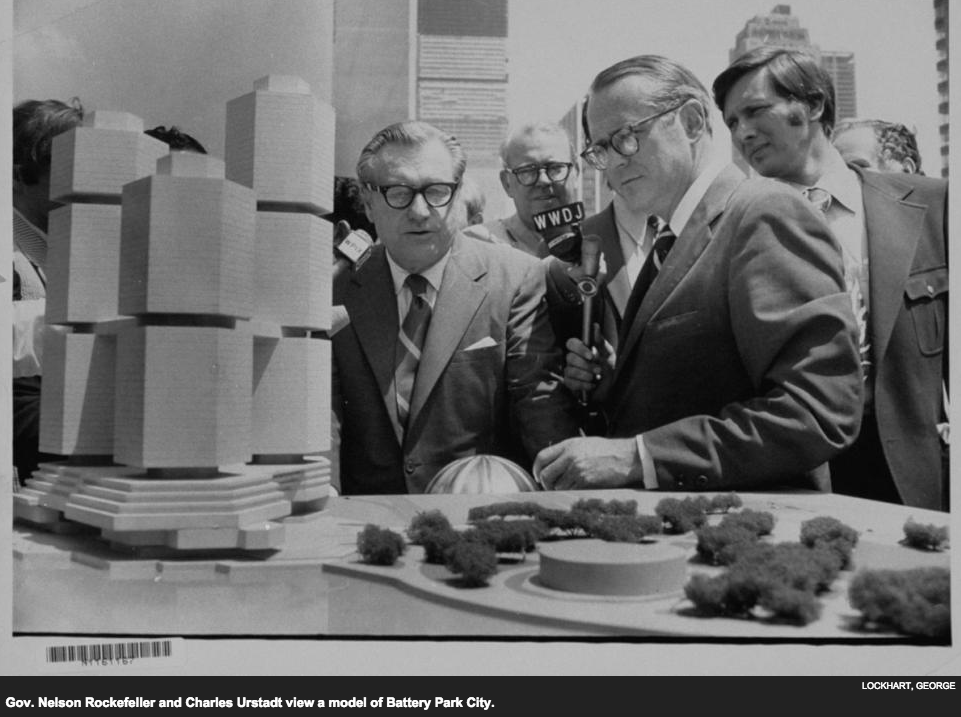The fight for a human-scale city continues.
This is week 4.
There is a LOT to catch up on. Refill your coffee. Lean in. Or maybe read this on Saturday morning while your kids are asleep.
But first things first. If you haven’t signed the petition for a human-scale city yet, do that first here. The list of co-sponsors of the petition is now up to 84 organizations from all five boroughs. The West Cunningham Park Civic Association and the Marine Park Civic Association were the most recent to sign on.
Thanks to Andrea Javaly, a volunteer from West 46th Street, and Darby Riley, an intern at Tribeca Trust, for helping put together this round-up.
First up, two invitations
- This Saturday, December 5, Community Town Hall sponsored by the Coalition to Save Chinatown and the Lower East Side. They are inviting De Blasio. No word yet on his RSVP. They are fighting the picture depicted below, among other important things, like getting their community plan accepted by the Mayor. They are mad, and rightly so. Support them, as their fight is our fight. It is all the same problem we are trying to fix.
SAT. DEC 5TH @ 4PM @ SEWARD PARK HIGH SCHOOL
350 GRAND ST (LUDLOW & ESSEX) - City Planning is holding an important public hearing on their draft Environmental Impact Statement concerning the Zoning for Quality and Affordability and Mandatory Inclusionary Zoning proposals. This happens on Wednesday December 16th at 9:00 am (likely to last a good part of the day).
Andrew Berman says it is crucial to attend the public hearing and I believe him. It will be at the beautiful landmarked Museum of the American Indian at Bowling Green near Battery Park. The architect of the building was the great Cass Gilbert whose masterpiece of course was the Woolworth, New York’s greatest tall building. So if you are trying to figure out how to justify taking time off our work for YET ANOTHER hearing in which you may be listened to politely and then ignored because of the flawed process, you can at least feast your eyes on truly great architecture while plotting how to reform our city government so that something more effective than mobbing public hearings can get results.
Since our last round-up, acts of terror have caused us to bow our heads in sorrow. The French had four days of official mourning and are now determined to win back their urbanity by going about their lives in their great city. For those of you who love Paris too, check out our colleague organization, SOS Paris, who works tirelessly to protect the built environment of one of the most human-scale cities in the world. Here is a link and a photo of one of the controversial buildings being contested.
Shelden Silver guilty! Hurrah! So justice gets done in one small way, and in the various discussions of it, the Quote of the Week Runner Up goes to the great Brennan Center at NYU (so much nobler than the Furman Center on real estate at NYU) with words spoken by Lawrence Norden:
“While corruption must be prosecuted and punished, what New Yorkers need most is wholesale reform of the political system.”
Here here. Especially the part where REBNY buys legislation for 421-a carve outs and such. Let’s fix that right now. Read it all here.
Save Chelsea, the Chelsea Waterside Park Association, and the Council of Chelsea Block Associations have teamed up on a joint petition opposing a beer hall on Pier 62, with a very well-argued case. Go here to read about it and sign.
Citizens Defending Libraries has a video on youtube outlining their case that the air rights deal for the Brooklyn Heights library stinks. Watch it here.
Steven Semes nails it again about the weird way architects see cities in a new article just published in The New Criterion called “Preserving the City of Tomorrow.” Read it here. He is a professor of architecture at Notre Dame and the author of the brilliant book that human-scale city fans should read, entitled “The Future of the Past”.
Propublica’s fantastic, Pulitizer-worthy investigative reporting continues on the way landlords abuse tax incentives and undermine rent stabilization. Tribecans, if you live in the Truffles building (or any rental building), you should be reading this series. Everyone should read it. It should inform how we change the way rent stabilized apartments are regulated. I’m long a fan of Propublica, but this series is one of their best.
Popular Academic Joins the Human-Scale party! Well sort of. She didn’t sign the petition, but she did write some strong stuff. Saskia Sassen, a Columbia U sociologist who has a big following for her writing on globalization and cities (her recent book is called “Explusions”) wrote a piece in The Guardian about how global real estate capital takes over places and wrecks them (well…. we did know that already, but its nice to hear a professor say it) Best quote is from her longer comment on Atlantic yards (shown below):
“This very urban mix of occupants will be thrown out and replaced by 14 formidable luxury residential towers – a sharp growth of density that actually has the effect of de-urbanising that space. It will be a sort of de facto “gated” space with lots of people; not the dense mix of uses and types of people we think of as “urban”. Click here to read the full article. And Professor Sassen, if you neglected to sign the petition, you can rectify that here. Thanks to scary smart Charles Komanoff for the heads up on the article.
 Rendering of Atlantic Yards courtesy of The Guardian.
Rendering of Atlantic Yards courtesy of The Guardian.
File this under, “Why we need a new Landmarks Commission”: Read about the horrible LPC-approved plan to raise a landmark theatre 29 feet [sic] so as to create more new retail space below it and at street level. The paywalled WSJ article is here. While Simeon Bankoff’s quotes therein almost got quote of the week, he was trumped by John Fisher of TenantNet who wins the Quote of the Week First Prize: “Aside from the conclusion that the Commissioners of the NYC Landmarks Preservation Commission and Community Board 5 are brain-dead, this action raises so many questions, in particular, the limitations of development rights, and puts those limitations into jeopardy.”
The Brilliant-if-totally-depressing-infographic prize this week goes to 6sqfeet who produced the image below. Read their equally depressing story here. What it means is that real estate capital doesn’t want to do affordable housing. Why should they, when they can play the more profitable game depicted below? But be not depressed. There is a solution. Since we created the game they are playing, and we can take that game away from them too by putting in height limits that can’t be tinkered with.
Mayor De Blasio’s Zoning Proposals were overwhelmingly rejected by community boards across the ENTIRE city. Brooklyn’s Community Boards are the most recent vote of “NO.” With 12 out of 18 Brooklyn boards rejecting the plan, they are the latest borough to join the efforts to keep these zoning plans from coming to fruition. Bronx had a 12 out of 12 vote for no, Queens had a 12 out of 14 vote for no and Manhattan had a 10 out of 12 vote for no. Last to vote will be Staten Island. Of their 3 community boards, only CB3 has voted so far. But that vote was a resounding 42-0 to disapprove. I would call that rejection. Unequivocal rejection. The smart thing to do for the Mayor now is to get rid of his terrible policy advisors, Beene, Weisbrod, and Glen. Find smarter people to figure this out. I am sure that can be done.
But the “progressive” Mayor is barreling forward on the reasoning, “who cares what the people think anyway?” thought. Hmmm. Politicians know that know community boards are just political cover for politicians in a “Potemkin Democracy” that would have made Golden Age Athenians riot. Even so, it is amazing that the community boards didn’t play along with the Mayor this time – the way they were supposed to and are expected to. The Mayor’s team seems to think “the people” are just being NIMBYish or are “afraid of change”, which suggests they don’t hear very well. Here’s a link to Vicki Beene and Carl Weisbrod condescending to their opponents on NY1 here. Listen and boo quietly a bit at the privacy of your desk. Then get someone to sign our petition here.
Check out this WBAI radio segment where journalist Jillian Jonas interviews a member of the Movement for Justice in El Barrio about how residents there view the Mayor’s proposals here.
Ok, so….Why does everyone hate these zoning proposals? A quick primer
The many objections to the zoning changes can be categorized into one of four criticisms.
Type 1 Criticisms: The zoning proposals just won’t work. The proposals involve flooding strong rental markets near subways and filling them up with cheaply built, high towers filled with market rate housing (and a small percentage of tiny affordable units in each tower). This won’t actually achieve the goals of getting affordable housing. What you’ll get is hyper-gentrification and direct and indirect displacement of existing low-income tenants and small businesses. Another variation of this critique is that the income levels for those who will get the few affordable units are set too high, that the units should be reserved for an even lower level of income. NYC Comptroller Scott Stringer recently joined the chorus on that type 1 criticism in a recent study that his office came out with on East New York. To read the Comptroller’s full analysis, click here.
Type 2 Criticism: The negative impacts are huge, truly awful, and not worth it. That includes the negative results of displacement, the incentivizing of the destruction of low- and mid- rise historic buildings; providing incentives to damage historic districts with pop-up architecture; stealing light and air and viewscapes via the up-zoning part of the proposal; weakening sliver laws; and handing giant profit margins over to the developers in a misguided view about how to “incentivize” them.
Type 3 Criticism: The conceptual thinking behind it is all wrong and there is another way. This includes the truth that there has been inadequate consideration of alternatives; the absence of clarity about what kind of density is optimal; the many attacks that the one-size-fits-all approach is doomed to fail in a diverse city like ours; and the whole idea that “hyper-density” is not the way to solve affordable housing. There is another critique too that I find very interesting: the concern that “floor-area-ratios” are now being considered by the Mayor and his developer friends as property right entitlements rather than as density caps about how construction can proceed. Last there is the intellectual equivalent of a bomb with the critique that the Mayor is trying to achieve policy via zoning rather than through substantive planning.
Type 4 Criticisms: City Planning is ramming this down our throats in a flawed process that serves Big Real Estate, not the people. In other words, process that is being used to push these proposals through is top-down, undemocratic, and ignores existing and proposed community-based plans. Variations of this objection include that the zoning changes were imposed from above, that they are being hurried through in an already flawed process in a rush-to-act manner; that they were hatched by developers whining over zoning rather than emanating from neighborhood initiatiave of which there is plenty; that the changes economically favor big real estate [surprise, surprise]; that it is creepy and wrong that community boards are voting before the draft Environmental Impact Statement was heard, modified and finalized. There’s more, but you get the gist.
Click here to see a very useful report that Landmarks West! sent out on ZQA and MIH. Click here to see Andrew Berman’s excellent op-ed that also summarizes the range of problems with these misguided zoning proposals.
The Award for “Political Equivocation of the Week” is going to have to be split, with a first prize and a runner up:
First Prize goes to City Councilman Jimmy Van Bramer who while admitting that his constituents, in LIC Queens, don’t want 50-story towers dwarfing their human-scale community also plays the field by saying that the developer of the towers (Tishman Speyer) are, “folks who have done good things.” And that he has an interest in, “running again in 2017.” All of this is nicely covered by stating that, “We can’t have the rezoning without a firm commitment in writing from the Department of Education that we’re building at least two new schools. And we need a park.” Heads up to Councilmember Van Bramer: the usual useless horse-trading over real estate deals isn’t going to work anymore. To read the full article in DNAInfo click here.
Runner up goes, with a heavy heart, to Manhattan Borough President Gale Brewer. After the peculiar Manhattan Borough Board vote against ZQA, Brewer said “I’m optimistic that we can win improvements to both the ZQA and MIH proposals in a way that my office can support in its own formal recommendation—before the City Planning Commission holds its hearing December 16.” Wow. That means its going though and some backroom deals are happening now as you read this.
Ouch. And we haven’t even had the hearing over the draft Environmental Impact Statement….! Will no other alternatives be considered? Are we just going to jigger with ZQA and MIH and claim the people were heard? Potemkim Democracy indeed.
Eyesore(s) of the Week:
Sutton Place’s 80-story tower! Bauhouse Group has filed demolition permits for the existing buildings at 426-432 East 58th Street, which will be razed to make room for the 900-foot, 115-apartment luxury tower designed by Norman Foster. But as this article details, the community is none to pleased. Is anybody? Stop the insanity!
Second favorite Quote(s) of the Week:
Charles Urstadt is one of the men who spearheaded the development of Battery Park City (BPC). BPC now produces up to $130m in surplus every year. In an interview with the Daily News he says “[Albany] is tapping the honey pot. But ever since 1983, the city has had the power to take control of the land under Battery Park for a mere $1. We’ve had 25 years of bad public policy on this issue.” Maybe that should have been understatement of the week. Read the article here. He suggests taking the BPC annual funds to issue bonds for affordable housing. On the face of it, sounds good. Why aren’t we doing that? Anyone know?
Wish I’d said it first:
“Boring landscapes impede on our biological need for intrigue. So why are so many buildings so hideous?”
In his article for Slate, Colin Eddard, discusses the “psychogeography” of everyday life and its impact on us as a society. His study took participants wired with tech to measure their physiological reactions. Then he had them stand on either a street block with a generic Whole Foods mega-store or on a street block filled with local, human-sized, restaurants, bodegas and bars. As predicted, the participant response was much more alive when the subject had something new to observe, sense and take in every 20 steps as opposed to the blank monotony of a bank of frosted glass window panes from the Whole Foods Market. “[W]e are biologically disposed to want to be in locations where there is some complexity, some interest. And this urge runs much deeper than a simple human aesthetic preference for variety. The urge to know is written into us at a very primitive level.”
For Eddard’s full article, click here.
Understatement of the Week Prize goes to Christabel Gough, Landmark Lion and Architecture Critic. In a letter to the Tribeca Trust about the dismal environmental review process for zoning reform, she concludes:
“The growing complexity, obscurity and insularity of environmental review can make it less accessible to citizens who want to participate, to the detriment of its original mission.” Read the letter here.
That’s all the news we can muster for this week. Corrections and commentary welcome.






